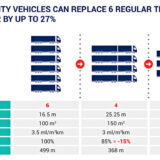
ACEA requests postponement of new Euro 6 standards for six months
ACEA, the trade group representing 16 major Europe-based car, van, truck and bus makers, has requested the European Commission for a six-month postponement of new Euro 6 standards due to significant build-up of inventory stocks resulting from the Covid-19 shutdown.
European emission standards define the acceptable limits for exhaust emissions of new vehicles sold in the European Union and EEA member states. The emission standards are defined in a series of European Union directives staging the progressive introduction of increasingly stringent standards.
In a letter to Thierry Breton, commissioner for the Internal Market, Industry, Entrepreneurship and SMEs, Mike Manley, ACEA president, and CEO of Fiat Chrysler Automobiles N.V., wrote that “the shutdown of production and sales imposed by Member States to fight Covid‐19 has caused a significant build‐up of stocks at manufacturers, importers and dealers. These vehicles meet current emission standards but not the new standards that will enter into force in the coming months. In total, we estimate that 600,000 produced vehicles will not meet Euro 6d ISC‐FCM while nearly 40,000 vehicles will not meet Euro 6d TEMP. As sales had to be stopped to fight Covid‐19, it is not clear when these vehicles will be sold.”
Euro 6d TEMP for heavy vans and ambulances will come into force (first registration) on the 1st of September 2020, while type approval for Euro 6d ISC‐FCM for passenger cars and light vans will start on the 1st of January 2021. Also included in the request was the postponement of Euro VI Step E for trucks, and the general safety regulation (clusters A and B).
“The grim reality is that many manufacturers have not been able to have their vehicles certified for meeting the new emission standards due to the disruption in the type approval process caused by government restrictions. We estimate that about 2,100 emission system type approvals are still pending for vehicles already meeting Euro 6d ISC‐FCM. Obtaining these, together with the subsequent whole vehicle type approval, will easily take six months in our view,” Manley continued.
“Without postponement of the application dates, manufacturers will face a choice between stockpiling newly produced vehicles until the type approval process is completed and stopping (or, better, not re‐starting) production of the vehicles concerned. It is clear the second option will have negative implications for workers, both at vehicle manufacturers and at suppliers.
“We continue to believe postponement is objectively justified by the disruption caused by the Covid‐19 situation. Other governments seem to think so, too. As you probably know, the Chinese government recently postponed the entry into force of the new particle number limit values for light‐duty vehicles in the China 6 emissions legislation by six months for exactly the same reasons while the Japanese government decided to postpone the date to switch from emissions and CO2 tested on cycle JC‐08 to WLTP for existing models by three months.
“While we accept that pollutant emissions are a sensitive political matter, we would like to emphasize that the proposed postponement will have no impact whatsoever on the emission level of the vehicles concerned or on air quality. In many cases, it will just mean vehicles will not be equipped with a fuel consumption meter.”













